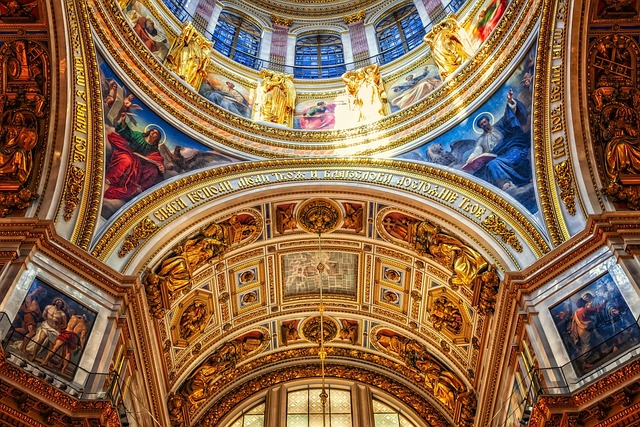The question of whether Orthodox Christianity came before Catholicism is a topic of historical and theological debate. Both Orthodox Christianity and Catholicism trace their roots back to the early Christian Church, but they developed distinctively different traditions and practices over time. Understanding the historical context and the key events that shaped these two branches of Christianity is essential to exploring their origins.
Table of Contents
Origins and Early Development of Orthodox Christianity
Did Orthodox Come Before Catholicism?
When it comes to the origins and early development of Orthodox Christianity, it’s important to understand the historical context in which it emerged. Many people wonder if Orthodox Christianity came before Catholicism or if it was the other way around. To answer this question, we need to delve into the early years of Christianity and explore how these two branches of the faith developed.
The roots of Orthodox Christianity can be traced back to the time of Jesus Christ and his apostles. After Jesus’ crucifixion and resurrection, his followers spread his teachings throughout the Roman Empire. These early Christians formed small communities and gathered in homes to worship and share their faith. This period is often referred to as the early Christian Church.
During the first few centuries, the Christian Church faced persecution from the Roman authorities. Despite this, the faith continued to grow and spread. As the Church expanded, it became necessary to establish a more organized structure to ensure unity and consistency in doctrine. This led to the development of a hierarchy within the Church, with bishops overseeing local congregations.
In the early centuries, there was no clear distinction between what we now know as Orthodox Christianity and Catholicism. The term “Catholic” simply meant universal, referring to the belief that the Church was for all people. However, as the Roman Empire began to decline, the Church in the West, centered in Rome, started to assert its authority and influence.
The Great Schism of 1054 marked a significant turning point in the history of Christianity. This event resulted in the formal split between the Eastern Orthodox Church and the Roman Catholic Church. The primary cause of the schism was a disagreement over the authority of the Pope and the use of unleavened bread in the Eucharist.
Before the schism, the Church was united in its beliefs and practices. However, as political and cultural differences between the East and West grew, tensions arose. The final break occurred when the Pope and the Patriarch of Constantinople excommunicated each other, effectively dividing the Church into two distinct branches.
So, to answer the question of whether Orthodox Christianity came before Catholicism, the answer is no. Both branches of Christianity emerged simultaneously in the early years of the faith. However, it was the Great Schism of 1054 that solidified the separation between the Eastern Orthodox Church and the Roman Catholic Church.
Despite their differences, both Orthodox Christianity and Catholicism share many core beliefs and practices. They both recognize the authority of the Bible, the sacraments, and the importance of the Church in the life of a believer. While there are theological and liturgical distinctions between the two, they are ultimately part of the same Christian tradition.
In conclusion, the origins and early development of Orthodox Christianity are closely intertwined with the history of Catholicism. While both branches emerged simultaneously in the early years of Christianity, it was the Great Schism of 1054 that formalized the split between the Eastern Orthodox Church and the Roman Catholic Church. Despite their differences, both branches share a common foundation in the teachings of Jesus Christ and continue to be vibrant expressions of the Christian faith today.
Historical Relationship Between Orthodox and Catholic Churches

Did Orthodox Come Before Catholicism?
When it comes to the historical relationship between the Orthodox and Catholic churches, it’s easy to get lost in the complexities and nuances of their shared past. However, one question that often arises is whether the Orthodox Church came before Catholicism. To answer this question, we need to delve into the origins of these two ancient Christian traditions and explore their development over the centuries.
To understand the historical relationship between the Orthodox and Catholic churches, we must first acknowledge that both trace their roots back to the early days of Christianity. In fact, the early Christian community was initially unified, with no clear distinction between what we now know as Orthodox and Catholic. However, as time went on, theological and political differences emerged, leading to a gradual separation between the two.
The first major split between the Orthodox and Catholic churches occurred in 1054 AD, an event known as the Great Schism. This division was the culmination of centuries of disagreements over various theological and ecclesiastical matters. The primary point of contention was the authority of the Pope, with the Orthodox Church rejecting the Pope’s claim to universal jurisdiction over the entire Christian Church.
While the Great Schism marked a significant turning point in the relationship between the Orthodox and Catholic churches, it is important to note that the Orthodox Church can trace its origins back even further. In fact, the Orthodox Church claims to be the original Christian Church, founded by Jesus Christ himself and led by the apostles. According to Orthodox tradition, the Church has remained faithful to the teachings and practices of the early Christian community, preserving the true essence of Christianity.
On the other hand, Catholicism emerged as a distinct entity within Christianity after the Great Schism. The Catholic Church, led by the Pope in Rome, developed its own unique doctrines and practices, which differed in some aspects from those of the Orthodox Church. Despite these differences, both the Orthodox and Catholic churches share a common heritage and many fundamental beliefs.
While the Orthodox Church can claim a longer history than Catholicism, it is important to remember that historical precedence does not necessarily imply superiority or exclusivity. Both the Orthodox and Catholic churches have made significant contributions to the development of Christianity and have played vital roles in shaping the course of Western civilization.
In recent years, there have been efforts towards reconciliation between the Orthodox and Catholic churches. Ecumenical dialogues and joint declarations have sought to bridge the theological and cultural gaps that have separated these two ancient traditions for centuries. These efforts reflect a growing recognition of the shared heritage and common goals of the Orthodox and Catholic churches.
In conclusion, the question of whether the Orthodox Church came before Catholicism is a complex one. While the Orthodox Church can trace its origins back to the early days of Christianity, the Catholic Church emerged as a distinct entity after the Great Schism. Both churches have played significant roles in the history of Christianity and have shaped the course of Western civilization. Ultimately, it is important to focus on the shared heritage and common goals of these two ancient traditions, rather than getting caught up in debates about historical precedence.
Key Differences in Doctrine and Practices Between Orthodox and Catholicism
Did Orthodox Come Before Catholicism?
When it comes to the history of Christianity, there is often confusion about the origins of the Orthodox and Catholic branches. Many people wonder which one came first and how they differ in terms of doctrine and practices. In this article, we will explore the key differences between Orthodox and Catholicism, shedding light on their historical development and unique characteristics.
To understand the origins of these two branches, we need to go back to the early days of Christianity. The Orthodox Church traces its roots back to the apostles and the early Christian communities in the Eastern Mediterranean. It claims to have preserved the original teachings and practices of the early Church, making it the true continuation of the apostolic tradition.
On the other hand, Catholicism emerged as a distinct branch of Christianity in the West, centered around the city of Rome. The Catholic Church also claims apostolic succession, tracing its authority back to the apostle Peter, whom Catholics believe was the first pope. While both Orthodox and Catholicism claim apostolic origins, their historical development took different paths.
One of the key differences between Orthodox and Catholicism lies in their understanding of the papacy. In Catholicism, the pope is seen as the supreme authority and the successor of Peter, with the power to make infallible pronouncements on matters of faith and morals. This concept of papal primacy is not accepted in Orthodox theology, where authority is shared among the bishops, with no single bishop having universal jurisdiction.
Another significant difference is the use of icons in worship. Orthodox Christianity places great emphasis on the veneration of icons, believing that they are windows into the divine realm. Icons are used in liturgical services and personal devotion, with believers kissing and bowing before them as a sign of reverence. In contrast, Catholicism has a more nuanced approach to icons, allowing their use but discouraging excessive veneration that could border on idolatry.
The liturgical practices of Orthodox and Catholicism also differ in certain aspects. Orthodox worship is characterized by its rich symbolism, elaborate rituals, and the use of ancient liturgical languages such as Greek or Slavonic. The Divine Liturgy, the central act of Orthodox worship, is celebrated with great solemnity and reverence. In Catholicism, the liturgy can vary depending on the particular rite or tradition, but it generally includes the celebration of the Eucharist and the sacraments.
While both Orthodox and Catholicism share a common belief in the Trinity, the divinity of Christ, and the importance of sacraments, there are some doctrinal differences between them. One notable difference is the understanding of original sin. Catholicism teaches that all humans inherit the guilt of Adam and Eve’s disobedience, while Orthodox theology emphasizes the consequences of sin rather than inherited guilt.
In conclusion, the Orthodox Church predates Catholicism in terms of historical development, tracing its origins back to the early Christian communities in the Eastern Mediterranean. The key differences between Orthodox and Catholicism lie in their understanding of the papacy, the use of icons, liturgical practices, and certain doctrinal nuances. Despite these differences, both branches of Christianity share a common faith in Christ and strive to live according to the teachings of the Gospel.
Influence of Orthodox Christianity on the Formation of Catholicism
Did Orthodox Come Before Catholicism?
When it comes to the history of Christianity, there is often confusion about the relationship between Orthodox Christianity and Catholicism. Many people wonder which came first and how they are connected. In this article, we will explore the influence of Orthodox Christianity on the formation of Catholicism, shedding light on this intriguing topic.
To understand the origins of Catholicism, we must first delve into the early days of Christianity. In the first few centuries after the death of Jesus Christ, there was no clear distinction between what we now know as Orthodox Christianity and Catholicism. Instead, there was a unified Christian community that spread throughout the Roman Empire.
However, as time went on, differences in theology and practice began to emerge within this Christian community. These differences eventually led to a split, resulting in what we now refer to as Orthodox Christianity and Catholicism. So, in a sense, both Orthodox Christianity and Catholicism can trace their roots back to the early Christian community.
Orthodox Christianity, as we know it today, developed in the Eastern part of the Roman Empire, with its center in Constantinople (modern-day Istanbul). This branch of Christianity emphasized the importance of tradition, liturgy, and the authority of the bishops. The Orthodox Church maintained a strong connection to the early Christian practices and teachings, preserving them throughout the centuries.
On the other hand, Catholicism emerged in the Western part of the Roman Empire, with its center in Rome. Catholicism placed a greater emphasis on the authority of the Pope, who was seen as the successor of Saint Peter, the first Bishop of Rome. The Catholic Church also developed its own distinct liturgical practices and theological traditions.
Despite these differences, it is important to note that Orthodox Christianity and Catholicism share many common beliefs and practices. Both recognize the authority of the Bible and the importance of the sacraments. Both also venerate saints and believe in the resurrection of Jesus Christ.
In fact, the influence of Orthodox Christianity on the formation of Catholicism cannot be overstated. The early Christian theologians and Church Fathers, many of whom were from the Eastern part of the Roman Empire, played a crucial role in shaping the theological foundations of Catholicism. Their writings and teachings continue to be highly regarded by both Orthodox Christians and Catholics.
Furthermore, the liturgical practices of the Orthodox Church have had a significant impact on Catholic worship. The use of icons, incense, and elaborate rituals can be traced back to the early Christian traditions that were preserved in the East. These practices were later adopted by the Catholic Church, enriching its worship and spirituality.
In conclusion, while Orthodox Christianity and Catholicism are distinct branches of Christianity, they are closely connected and share a common history. Orthodox Christianity, with its emphasis on tradition and the authority of the bishops, played a significant role in the formation of Catholicism. The influence of the early Christian theologians and the liturgical practices of the Orthodox Church can still be seen in Catholicism today. So, did Orthodox come before Catholicism? In a way, yes, but it is more accurate to say that they both emerged from the same early Christian community and have influenced each other throughout history.
Conclusion
In conclusion, Orthodox Christianity emerged before Catholicism.
For licensing reasons, we must provide the following notice: This content was created in part with the help of an AI.


